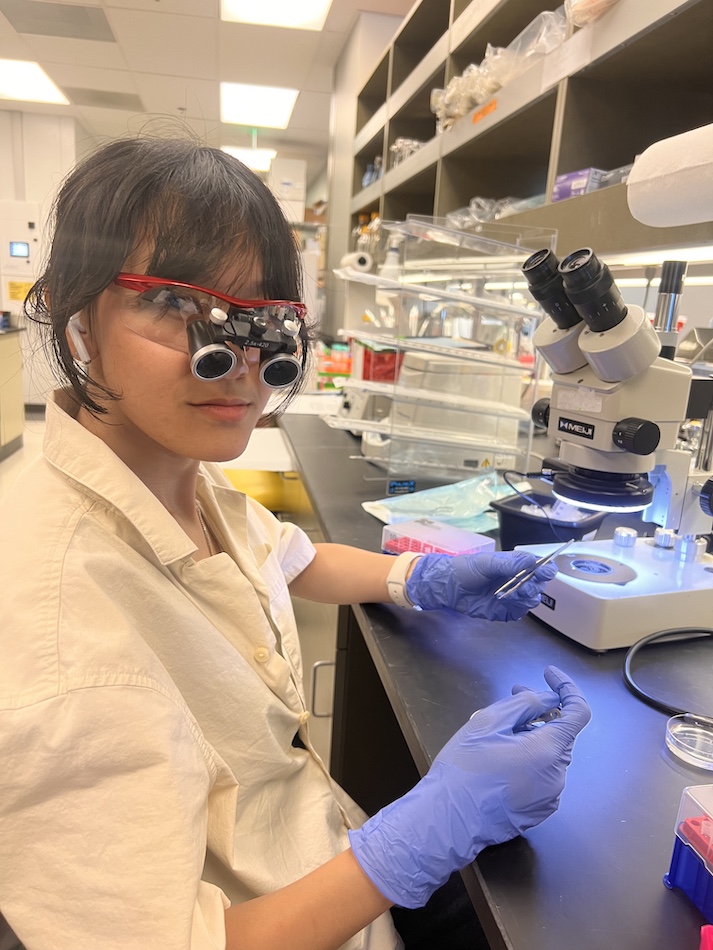Filmmaker Matthew Ellenbogen is out to capture the hidden side of immune system research. As Creative Producer at La Jolla Institute for Immunology (LJI) Ellenbogen strives to show the hard work that goes on in LJI laboratories—and make a case for why this research deserves support.
This mission is personal for Ellenbogen. Several years ago, a close family member of Ellenbogen was diagnosed with an incurable degenerative disease. He felt helpless when he got the news.
“I’m not a scientist. I’m not an M.D. My background is television, film, new media, so what can I do?” says Ellenbogen. “But I do have the opportunity to use my skill set at LJI and support what the scientists are doing.”
For example, in his video series for the Rickey and Tullies Families SPARK Awards for Innovations in Immunology, Ellenbogen profiles early career scientists investigating heart disease, cancers, COVID-19, and more. He’s also traveled to Mexico and Nepal to film with important LJI research collaborators and supporters. [Watch: In Nepal with Dr. Melissa McCauley]
Ellenbogen says he loves the challenge of taking a complex scientific concept, such as how flow cytometry works, and sharing it with a non-scientific audience.
He’s always been interested in depicting the inner workings of the world. Before joining the LJI Communications Department, Ellenbogen ran his own studio, where he produced videos for a long list of San Diego clients, including Father Joe’s Village, which offers services to San Diego’s unhoused community. “Their stories were so complicated—so human,” says Ellenbogen.
Ellenbogen considers himself lucky to get to ask people, especially researchers, about the motivations behind their work.
“These really are true leaders in science,” he says. “And I can only imagine the pressures they are under to do good work. And I get to meet with people and set up a camera or take a photo and ask them questions. I feel informed and humbled.”
Ellenbogen’s latest short film focuses on one person’s deeply personal story—a story that made it all the way to the Golden Gate Film Festival.
Ellebogen’s film, titled Specialty Finishing, is a profile of Kat, an artist and craftsperson grappling with two autoimmune diseases. Kat was first diagnosed with type 1 diabetes, which requires her to constantly monitor her blood glucose. “That was really weird—the thought that I have to do this all the time,” says Kat, whose last name is not public. “I’ve learned to live with it, and I’m very lucky because it’s manageable and they have medicine.”
Kat’s rheumatoid arthritis (RA) diagnosis was much more devastating. “It was so bad. When it hit, I couldn’t move, I couldn’t get out of bed,” says Kat. “Apparently I vaulted right into severe RA.”
In the film, Ellenbogen has Kat tell her story in her own words. Instead of focusing on what RA has taken from her, Kat explains how cutting-edge drug therapies have allowed her to continue adding beautiful finishes to the furniture and rooms she designs.
Ellenbogen doesn’t use medical imagery to illustrate this story. Instead, he documents Kat in her day-to-day work. With each dab of paint and purposeful brushstroke, Kat demonstrates the life-changing power of immune system research.
“So often, stories about disease are focused on the negative,” says Ellenbogen. “But her story is really a story of modern medicine and basic research leading to treatments for people—that let them live the life that they want to live.”
As Ellenbogen edited Kat’s video, he knew he had something special. After reviewing the short film with a small group of LJI supporters, Ellenbogen entered it in the 2024 Golden State Film Festival. The film was accepted and screened on Feb. 25, 2024 at the historic Chinese Theater on Hollywood Blvd.
This is the same theater where The Wizard of Oz premiered in 1939 and where Star Wars premiered in 1977—the same theater where Groucho Marx, Marlyn Monroe, and many other film legends have their handprints preserved in concrete.
The film festival was relatively small, explains Ellenbogen. Still, it gave him a chance to showcase the impact of immune system research in an important venue. There was also something amazing about sharing the experience with a live audience. He could hear the audience’s reactions. They gasped at certain points in the film and applauded at the very end.
“It made me feel really proud of the piece,” says Ellenbogen. “Of course, you can reach millions of people on YouTube, but there’s something about sitting down to watch it in a room full of people—and the lights go down.”
“I felt really honored,” he says.


